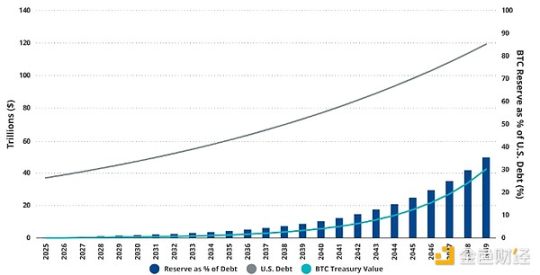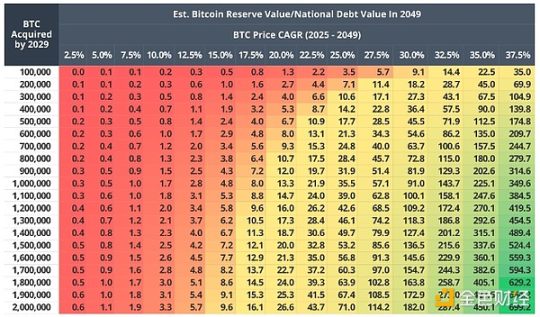VanEck: By 2049, U.S. Bitcoin reserves may reduce national debt by 35%

Reprinted from panewslab
12/23/2024·5MAuthor: Brayden Lindrea, CoinTelegraph
Compiled by: Deng Tong, Golden Finance
Asset management company VanEck said that if the United States established a reserve of 1 million bitcoins in accordance with the bill proposed by Senator Cynthia Lummis, the United States could reduce its national debt by 35% in the next 24 years.
VanEck estimates that Bitcoin will grow at a compound annual growth rate (CAGR) of 25% to $42.3 million by 2049, while U.S. Treasuries will grow at a CAGR of 5%, from $37 trillion at the start of 2025. $119.3 trillion.
"By 2049, this reserve could account for 35% of the national debt, offsetting approximately $42 trillion in debt," Matthew Sigel, director of digital asset research at VanEck, and investment analyst Nathan Frankovitz said in a report on December 20. "

The U.S. national debt is expected to increase as Bitcoin reserves grow from 2025 to 2049. Source: VanEck
"Optimistic" forecasts believe that Bitcoin's 25% compound annual growth rate will start from the $200,000 price point in 2025. Bitcoin is currently trading at $95,360 and would need to more than double to reach the starting point noted by VanEck.
Bitcoin's price rise to $42.3 million means it accounts for about 18% of global financial assets - far higher than the roughly 0.22% it accounts for in today's $900 trillion market.

U.S. Treasury and Bitcoin reserve holdings and Bitcoin value are estimated to grow at a CAGR of 25%. Source: VanEck
The new administration of Donald Trump has floated the idea of a Bitcoin reserve, which has pushed Bitcoin prices past six figures, but Senator Loomis' bill has still not been reviewed by the Senate or House of Representatives.
Strike founder and CEO Jack Mallers claimed earlier this month that Trump may issue an executive order on his first day in office to designate Bitcoin as a reserve asset.
Under the Lummis Act, the United States can repurpose 198,100 Bitcoins it holds due to asset seizures, while the remaining 801,900 Bitcoins can be financed through emergency support functions, sell a portion of its $455 billion gold reserves in exchange for Bitcoins, or both Both — all without printing money and taxpayer dollars, VanEck noted.
Sigel and Frankovitz said Bitcoin adoption at the U.S. state, institutional and corporate levels will also boost CAGR estimates for Bitcoin and Ethereum exchange-traded fund issuers.
Sigel explained in a Dec. 21 as currency.
They noted: “Bitcoin is likely to be widely used as a settlement currency for global trade by countries that wish to avoid the parabolic increase in U.S. dollar sanctions.”



 chaincatcher
chaincatcher